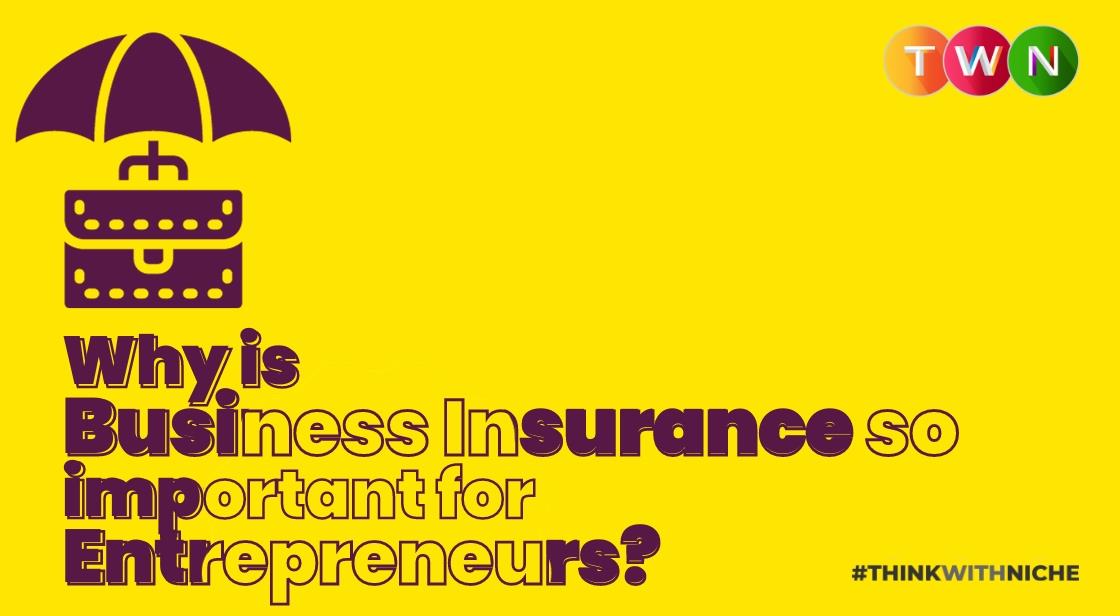Why is Business Insurance important for Entrepreneurs?

Blog Post
Running a business resembles a dynamic journey—filled with triumphs, innovations, and unprecedented challenges. Yet, amid the pursuit of success, there looms an array of uncertainties that can pose substantial threats. Natural calamities, legal liabilities, unforeseen disruptions—each capable of disrupting the very fabric of your hard-built enterprise.
As an entrepreneur, your vision and dedication have shaped your business into a thriving reality. However, the path to sustained success is often fraught with unforeseen hurdles, ones that can bring operations to a standstill, damage assets, or even lead to financial ruin.
In the face of these unpredictable events, the indispensability of business insurance emerges as an invaluable safeguard—a safety net that shields your enterprise against the unpredictable, empowering you to navigate challenges with resilience while focusing steadfastly on achieving your business goals.
This extensive guide delves deep into the vital world of business insurance. It elucidates the multifaceted facets of this protective mechanism, exploring its diverse types, coverage scopes, and indispensable roles in safeguarding businesses of all scales.
From shielding against property damage to mitigating liabilities, safeguarding against interruptions to fortifying workforce well-being, this guide outlines the pivotal reasons why business insurance stands as a non-negotiable asset in the arsenal of any thriving enterprise.
Let’s embark on a journey through the realms of risk mitigation and financial protection, uncovering the criticality of business insurance in fortifying the resilience and longevity of your entrepreneurial endeavors.
As an entrepreneur, you've poured your heart and soul into building your business, transforming your vision into a thriving reality. However, the path to success is not without its challenges. Unforeseen events, from natural disasters to lawsuits, can disrupt operations, damage property, and even lead to financial ruin.
This is where business insurance steps in, acting as a safety net that protects your business from a multitude of risks, allowing you to navigate challenges with confidence and focus on achieving your goals.
Why Business Insurance Matters ?
Understanding Business Insurance
Business insurance is a type of insurance that protects businesses from financial losses due to unforeseen events such as property damage, liability claims, employee injuries, and business interruptions. It is essential for businesses of all sizes, as it can help to safeguard their assets, protect their reputation, and ensure their continued operation in the face of adversity.
Types of Business Insurance Coverage
There are many different types of business insurance coverage available, and the specific coverages that a business needs will vary depending on the type of business, its size, and its location. Some of the most common types of business insurance coverage include:
1. General Liability Insurance: Shielding Your Business from Unforeseen Claims
General liability insurance, often referred to as business liability insurance or commercial general liability insurance (CGL), provides comprehensive coverage for a broad range of liability claims that could arise from your business operations, products, or services. It acts as a financial safety net, protecting your business from the potentially crippling costs of litigation, settlements, and judgments.
Scope of Coverage
General liability insurance encompasses a wide range of potential liabilities, including:
-
Bodily Injury: If a customer, visitor, or third party sustains bodily injury due to your business operations, premises, or products, general liability insurance can cover the associated medical expenses, lost wages, and pain and suffering.
-
Property Damage: In the event that your business causes damage to someone else's property, whether it's a customer's laptop, a vendor's equipment, or a neighbor's house, general liability insurance will cover the repair or replacement costs.
-
Personal Injury: Beyond bodily harm, general liability insurance also extends to claims of personal injury, including libel, slander, defamation, and copyright infringement. It protects your business from the financial repercussions of reputational damage and legal action stemming from these types of claims.
2. Professional Liability Insurance: Shielding Your Expertise from Claims
In the world of professional services, where expertise and knowledge are essential commodities, the risk of claims arising from professional negligence or misconduct is ever-present. Professional liability insurance, also known as errors and omissions (E&O) insurance, serves as a protective shield, safeguarding professionals from the financial consequences of such claims.
Professional liability insurance provides coverage for professionals against claims of negligence, errors, or omissions in their professional services. It protects individuals and businesses that offer specialized expertise, advice, or services, such as accountants, lawyers, doctors, engineers, architects, consultants, and other licensed professionals.
Scope of Coverage
Professional liability insurance encompasses a broad spectrum of claims, including:
-
Negligence: If a client suffers financial losses due to a professional's negligent actions or omissions, professional liability insurance will cover the associated damages.
-
Errors and Omissions: In the event that a professional's error or omission leads to client losses, professional liability insurance will provide financial protection.
-
Misrepresentation: Claims arising from misrepresentation of facts or failure to disclose material information are also covered under professional liability insurance.
-
Breach of Contract: If a professional's actions or inactions constitute a breach of contract, leading to financial losses for the client, professional liability insurance will offer coverage.
3. Product Liability Insurance: Safeguarding Your Business Against Product-Related Claims
IProduct liability insurance, also known as product recall insurance or product defect insurance, provides comprehensive coverage for claims arising from injuries or property damage caused by defects or malfunctions in your products. It protects businesses from the potentially crippling costs of litigation, settlements, and judgments related to product-related incidents.
Scope of Coverage
Product liability insurance encompasses a wide range of product-related claims, including:
-
Design Defects: If a product's design inherently poses a risk of injury or damage, product liability insurance will cover claims arising from such defects.
-
Manufacturing Defects: Defects in the manufacturing process that lead to product malfunctions or unsafe conditions can result in claims covered by product liability insurance.
-
Marketing and Labeling Defects: Inadequate or misleading product warnings, instructions, or marketing materials can also give rise to claims that are covered under product liability insurance.
-
Failure to Warn: If a product's potential hazards are not adequately communicated to users, resulting in injuries or damage, product liability insurance will provide coverage.
4. Commercial Auto Insurance: Navigating the Roads with Financial Protection
Commercial auto insurance, also known as business auto insurance or fleet insurance, provides comprehensive coverage for businesses that own, lease, or rent vehicles for commercial purposes. It protects businesses from the financial burdens associated with accidents involving their vehicles, whether they are involved in collisions, cause property damage, or lead to injuries.
Scope of Coverage
Commercial auto insurance encompasses a wide range of vehicle-related claims, including:
-
Bodily Injury Liability: If a commercial vehicle accident results in bodily injury to others, commercial auto insurance will cover the associated medical expenses, lost wages, and pain and suffering.
-
Property Damage Liability: Damage to property caused by a commercial vehicle, whether it's another car, a building, or a roadside fixture, is covered under commercial auto insurance.
-
Uninsured/Underinsured Motorist Coverage: In the event that a commercial vehicle is involved in an accident with an uninsured or underinsured motorist, commercial auto insurance provides compensation for bodily injury and property damage.
-
Collision Coverage: If a commercial vehicle is damaged due to an accident, collision coverage will pay for the repair or replacement of the vehicle, up to the policy limits.
-
Comprehensive Coverage: Comprehensive coverage extends to damage caused by events other than collisions, such as theft, vandalism, fire, or natural disasters.
5. Cyber Liability Insurance: Shielding Your Business from the Digital Frontier
Cyber liability insurance, also known as cybersecurity insurance or data breach insurance, provides comprehensive coverage for businesses that handle sensitive data, operate online platforms, or rely on digital technologies. It protects businesses from the financial losses associated with cyberattacks, including data breaches, network intrusions, and cyber extortion.
Scope of Coverage
Cyber liability insurance encompasses a wide range of cyber-related claims, including:
-
Data Breach Costs: In the event of a data breach that compromises customer or employee personal information, cyber liability insurance will cover the costs of notifying affected individuals, providing credit monitoring services, and potentially offering identity theft protection.
-
Network Security Breach: If a cyberattack compromises your business's network, resulting in data loss or system downtime, cyber liability insurance will cover the costs of restoring your systems, recovering lost data, and mitigating the impact of the breach.
-
Cyber Extortion: If your business falls victim to a ransomware attack, where hackers demand payment in exchange for unlocking your systems, cyber liability insurance can cover the ransom demand, negotiation expenses, and data recovery costs.
-
Cyber Business Interruption: In the event that a cyberattack forces your business to shut down or operate at a reduced capacity, cyber liability insurance will cover lost income and expenses incurred during the disruption.
-
Regulatory Compliance: If your business is subject to data privacy regulations, such as GDPR or HIPAA, cyber liability insurance can cover legal defense costs and potential fines arising from non-compliance in the wake of a cyberattack.
6. Business Property Insurance: Safeguarding Your Physical Assets
Business property insurance, also known as commercial property insurance or business personal property insurance (BPP), provides comprehensive coverage for businesses against physical losses to their property. It protects your business from the financial burdens associated with repairs, replacements, and business interruptions caused by unforeseen events.
Scope of Coverage
Business property insurance encompasses a wide range of property-related claims, including:
-
Direct Physical Damage: If your business property is damaged or destroyed by events such as fire, lightning, windstorm, hail, or explosions, business property insurance will cover the costs of repairs or replacements.
-
Theft and Vandalism: Losses due to theft or vandalism of your business property, including equipment, inventory, and outdoor fixtures, are covered under business property insurance.
-
Business Interruption: In the event that a covered property loss forces your business to shut down or operate at a reduced capacity, business property insurance will provide compensation for lost income and ongoing expenses.
-
Water Damage: Damage caused by water ingress, such as burst pipes, floods, or sprinkler systems, is covered under business property insurance.
-
Electronic Equipment Coverage: Protection extends to electronic equipment, including computers, servers, and other technology essentials, against damage from power surges, electrical malfunctions, and other electronic-related perils.
7. Business Interruption Insurance: Safeguarding Your Revenue Stream
Business interruption insurance provides financial compensation for businesses that experience a loss of income or incur additional expenses due to a covered event that interrupts their operations. It protects businesses from the financial burden of lost revenue, ongoing expenses such as rent, salaries, and utilities, and the costs of alternative arrangements to maintain business continuity.
Scope of Coverage
Business interruption insurance covers a wide range of events that can disrupt business operations, including:
-
Property Damage: If a covered property loss, such as a fire, flood, or windstorm, forces your business to close or operate at a reduced capacity, business interruption insurance will compensate you for lost income and ongoing expenses.
-
Civil Authority Orders: When government-mandated orders, such as mandatory evacuations or road closures, prevent your business from operating normally, business interruption insurance will provide coverage for lost income and expenses.
-
Utility Outages: Interruptions in essential utilities, such as power, water, or telecommunications, can significantly impact business operations. Business interruption insurance covers lost income and expenses caused by these disruptions.
-
Supply Chain Disruptions: Delays or disruptions in the supply chain can lead to shortages of raw materials or finished goods, forcing businesses to halt or reduce operations. Business interruption insurance provides coverage for lost income and expenses arising from supply chain disruptions.
-
Cyberattacks: In the event of a cyberattack that compromises your business's systems and data, causing downtime or operational disruptions, business interruption insurance can cover lost income and expenses.
7. Workers' Compensation Insurance: Protecting Your Workforce and Your Business
Workers' compensation insurance is a mandatory form of insurance that employers must provide to their employees in most jurisdictions. It provides financial benefits to employees who are injured or become ill on the job, regardless of who is at fault for the incident. These benefits include:
-
Medical Expenses: Workers' compensation insurance covers the full cost of medical expenses resulting from work-related injuries or illnesses, including doctor visits, hospital stays, surgeries, and prescription medications.
-
Lost Wages: Employees who are unable to work due to a work-related injury or illness receive a portion of their lost wages, typically two-thirds of their average weekly wage, to help them maintain their financial stability during their recovery.
-
Disability Benefits: For employees who suffer permanent disabilities due to work-related injuries or illnesses, workers' compensation insurance provides long-term disability benefits to support their ongoing needs.
-
Death Benefits: In the tragic event that an employee dies due to a work-related injury or illness, workers' compensation insurance provides death benefits to the employee's dependents, helping them cope with the financial loss of their loved one.
Scope of Coverage
Workers' compensation insurance covers a broad spectrum of work-related injuries and illnesses, including:
-
Traumatic Injuries: Injuries sustained from accidents, such as falls, slips, trips, and machinery accidents, are covered under workers' compensation insurance.
-
Occupational Diseases: Illnesses caused by prolonged exposure to hazardous substances or repetitive work activities are also covered under workers' compensation insurance.
-
Mental and Emotional Injuries: Mental stress, anxiety, and post-traumatic stress disorder (PTSD) arising from work-related events can also be covered under workers' compensation insurance, depending on the jurisdiction.
-
Aggravation of Pre-Existing Conditions: If a work-related injury or illness worsens an existing medical condition, workers' compensation insurance will cover the costs associated with the aggravated condition.
-
Occupational Exposure to Communicable Diseases: Employees who contract communicable diseases, such as tuberculosis or hepatitis B, due to their work in healthcare or other high-risk environments are typically covered under workers' compensation insurance.
In addition to these standard types of business insurance, there are also many specialized types of insurance available, such as:
-
Directors and officers (D&O) insurance: This type of insurance protects directors and officers of a company from claims of negligence or wrongdoing.
-
Employment practices liability insurance (EPLI): This type of insurance protects businesses from claims of discrimination, harassment, and wrongful termination.
-
Fidelity insurance: This type of insurance protects businesses from losses due to employee theft or fraud.
Also Read: Business Renters Insurance Can Save Your Company – Know How!
Importance of Business Insurance
1. Guarding Against Property Damage and Losses
From natural disasters like hurricanes and earthquakes to fires and vandalism, property damage can pose a significant financial burden to businesses. Business insurance provides coverage for repairs and replacements, ensuring you can restore your business premises and equipment back to their functional state without incurring crippling expenses.
2. Providing Liability Protection
Liability claims arise from situations where your business is held responsible for causing harm or damage to others. Whether it's a customer slipping and falling on your premises or a product causing injury, business insurance can cover legal defense costs, settlements, and potential judgments, shielding your business from financial ruin.
3. Covering Employee Injuries and Work-Related Illnesses
Workplace accidents and occupational illnesses are unfortunate realities that can impact both employees' well-being and your business's operations. Workers' compensation insurance provides coverage for medical expenses, lost wages, and disability benefits, ensuring your employees receive the necessary care and compensation while protecting your business from financial liabilities.
4. Protecting Against Business Interruptions
Business interruptions, caused by events such as power outages, supply chain disruptions, or natural disasters, can bring your operations to a halt, leading to significant revenue losses. Business interruption insurance compensates you for lost income and helps cover ongoing expenses, allowing you to get your business back on track quickly.
5. Safeguarding Your Business Assets
Business insurance extends beyond physical property and liability claims, covering valuable assets such as inventory, data, and intellectual property. It protects you from financial losses in the event of theft, cyberattacks, or other unforeseen events that could jeopardize your business's intellectual property or sensitive data.
6. Ensuring Peace of Mind and Focus
Operating a business involves navigating a complex landscape of potential risks. Business insurance provides a sense of security and peace of mind, allowing you to focus on strategic growth and development without the constant fear of financial setbacks.
Conclusion
Business insurance is not merely an expense; it is an investment in your business's future. By safeguarding your enterprise against a wide range of risks, business insurance empowers you to weather the storms, protect your assets, and pursue your entrepreneurial dreams with greater confidence and resilience. Embrace business insurance as an invaluable tool for risk mitigation and long-term success, ensuring that your business remains resilient and well-equipped to navigate the challenges and opportunities that lie ahead.
You May Like
EDITOR’S CHOICE












